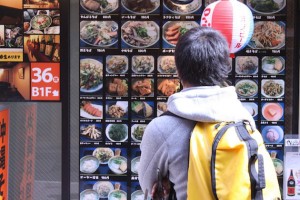Have you ever been in a restaurant where the menu has six pages? I find it impossible to make a decision. Whatever I choose, I always end up wondering if I selected the best dish. Most of the times, my husband laughs at my selection… he believes it often turns out to be the worst thing on the menu! I hate to admit it, but he might be right! When there are too many options, I don’t know what to have, so I resort to chicken, the safest, but most common and boring choice.

I’m certainly not suggesting going back to that period of time. No woman I know wants to go back to the kitchen full time and have a life of servitude. However, it is undeniable that this increase in freedom and choice came with a price!
In his 2004 book The Paradox of Choice: Why More is Less, Barry Schwartz talks about the fact that while individuals are now offered more freedom and choice, depression seems to be taking epidemic proportions.
Schwartz partly attributes that fact to the paralyzing effect of the infinite choice, which, according to him, is extremely exhausting to the human psyche. It raises expectations (if you have many choices, one of them must be perfect) and it creates dissatisfaction (if you’re buying salad dressing and you’re not happy with your choice, it is easy to imagine the alternatives as being much better than your selection, so you end up unhappy about it).
Schwartz gives 11 ways to minimize stress caused by the debilitating effect of decision-making:
– choose when to choose
– be a chooser and not a picker
– satisfice more and maximize less
– think about the opportunity costs
– make decisions non reversible
– practice an attitude of gratitude
– regret less
– anticipate adaptation
– control expectations
– curtail social comparison
– learn to love constraints
I can completely relate to the fact that the abundance of choice can have a negative impact on happiness! Probably, because it amplifies the myth that perfection exists. We tend to believe that if there is such a wide selection, there must be a perfect choice! The problem is there is no such a thing as the perfect job, the perfect time to have children, the perfect spouse, the perfect house or the perfect meal! And when you take too much time to make a decision, you miss opportunities!
Analysis by paralysis…. that is what needs to be avoided when it comes to choices! Choosing means being in motion,… but it has to be done with no regret and no expectations! And you always have to be ready to change direction if need be! At least, even if you slightly change your goals, you’ll always feel you’re going forward!
The author is Alina Boutros, who owns a University Master’s Degree in Literary Studies, has been researching happiness for the past year. You can read her daily posts on http://alina-500daystohappiness.blogspot.com



I totally agree……….well said!
Yes, I agree that having less is more… having less seems to simplify your life. At least once a year I go through clothes and other items in my cupboards and give away or throw out things that I no longer need. It certainly feels like a huge weight lifting off your shoulders.
Practicing the attitude of gratitude is also a great way for being satisfied with what you have already in your life.